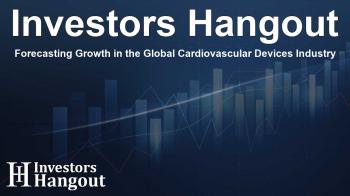Forecasting Growth in the Global Cardiovascular Devices Industry

Cardiovascular Devices Market Overview
The global cardiovascular devices market is positioned for significant growth, currently valued at USD 72.83 billion in 2023. Projections indicate that this market will expand at a compound annual growth rate (CAGR) of 7.3%, potentially reaching USD 110.39 billion by 2029. This remarkable growth trajectory can be attributed to several factors including the increasing incidence of cardiovascular diseases (CVD), an aging population, and a rise in risk factors such as diabetes, hypertension, and obesity.
Drivers Behind Market Growth
Several key trends are driving the cardiovascular devices market forward. Technological advancements are reshaping the landscape, with innovations like bioresorbable stents, drug-eluting stents, and enhanced imaging systems improving both procedural success and patient outcomes. Emerging markets are also focusing on modernizing healthcare infrastructure, with increased investments expected to elevate the adoption of cardiovascular devices. Furthermore, there is a growing patient preference for minimally invasive procedures that offer shorter recovery times and rapid diagnoses, further boosting the demand.
Product Segmentation in Cardiovascular Devices
The cardiovascular devices market can be segmented based on product type including cardiac imaging, rhythm management, interventional devices, cardiac assist devices, electrophysiology devices, and monitoring devices. Among these, cardiac imaging and diagnostic devices are projected to dominate the market due to their extensive application in monitoring cardiovascular conditions. Devices like ECGs, cardiac MRI, and CT scans play a crucial role in diagnosing conditions such as arrhythmias and coronary artery disease.
Importance of Advanced Diagnostic Technologies
The shift towards advanced diagnostic technologies cannot be overlooked. ECGs enable real-time monitoring while allowing for early detection of abnormalities. The increasing prevalence of cardiovascular diseases necessitates precise diagnostics, making wearable cardiac monitors like Holter monitors and portable ECGs critical for continuous patient monitoring.
Indications and End-User Segmentation
In terms of indications, the cardiovascular devices market is broken down into categories such as coronary artery disease, arrhythmias, and structural heart disease, among others. Arrhythmias hold the largest market share, reinforcing the importance of effective diagnostic and treatment solutions.
Market Trends Among Healthcare Providers
From an end-user perspective, hospitals remain the leading consumers of cardiovascular devices. The presence of specialized facilities and equipment supports complex procedures such as angioplasty and stenting within hospital settings. As patient demand for these services grows, hospitals are adapting to accommodate innovations in catheterization and interventional cardiology.
Regional Market Insights
North America is currently the largest market for cardiovascular devices, trailed by Europe and Asia Pacific. The region has witnessed rapid advancements in technology, particularly in catheter-based interventions and imaging techniques, significantly enhancing procedural safety and success rates. Innovative developments in drug-eluting stents and vascular scaffolds continue to shape the landscape, making these tools essential for healthcare providers aiming to improve patient outcomes.
Key Players in the Cardiovascular Devices Market
Leading companies in the global cardiovascular devices market include Medtronic Plc, Abbott Laboratories, Boston Scientific Corporation, and GE Healthcare Technologies, among others. These companies are at the forefront of introducing innovative cardiovascular health solutions, ranging from leadless pacemakers to drug-eluting stents, proving to be pivotal in addressing patient needs in this evolving market.
Conclusion
The cardiovascular devices market represents a dynamic growth opportunity influenced by technological advancements and changing patient preferences. As the healthcare sector evolves, companies involved in this market will be instrumental in enhancing patient care through innovative devices and procedures. Continuous research and development, coupled with a focus on reducing procedural risks, will be vital for capturing the growing demand in the cardiovascular devices market.
Frequently Asked Questions
What is the expected growth rate of the cardiovascular devices market?
The cardiovascular devices market is expected to grow at a CAGR of 7.3% from 2023 to 2029.
What factors are driving the growth in this market?
Growth is driven by an aging population, increasing prevalence of cardiovascular diseases, and technological advancements.
Which segment is projected to hold a significant market share?
Cardiac imaging and diagnostic devices are projected to hold a significant market share due to their application in treating cardiovascular conditions.
What role does patient preference play in the market?
Patients are increasingly favoring minimally invasive procedures, facilitating the demand for advanced cardiovascular devices.
Who are the main players in the cardiovascular devices market?
Main players include Medtronic, Abbott Laboratories, and Boston Scientific Corporation, among others.
About The Author
Contact Logan Wright privately here. Or send an email with ATTN: Logan Wright as the subject to contact@investorshangout.com.
About Investors Hangout
Investors Hangout is a leading online stock forum for financial discussion and learning, offering a wide range of free tools and resources. It draws in traders of all levels, who exchange market knowledge, investigate trading tactics, and keep an eye on industry developments in real time. Featuring financial articles, stock message boards, quotes, charts, company profiles, and live news updates. Through cooperative learning and a wealth of informational resources, it helps users from novices creating their first portfolios to experts honing their techniques. Join Investors Hangout today: https://investorshangout.com/
The content of this article is based on factual, publicly available information and does not represent legal, financial, or investment advice. Investors Hangout does not offer financial advice, and the author is not a licensed financial advisor. Consult a qualified advisor before making any financial or investment decisions based on this article. This article should not be considered advice to purchase, sell, or hold any securities or other investments. If any of the material provided here is inaccurate, please contact us for corrections.

